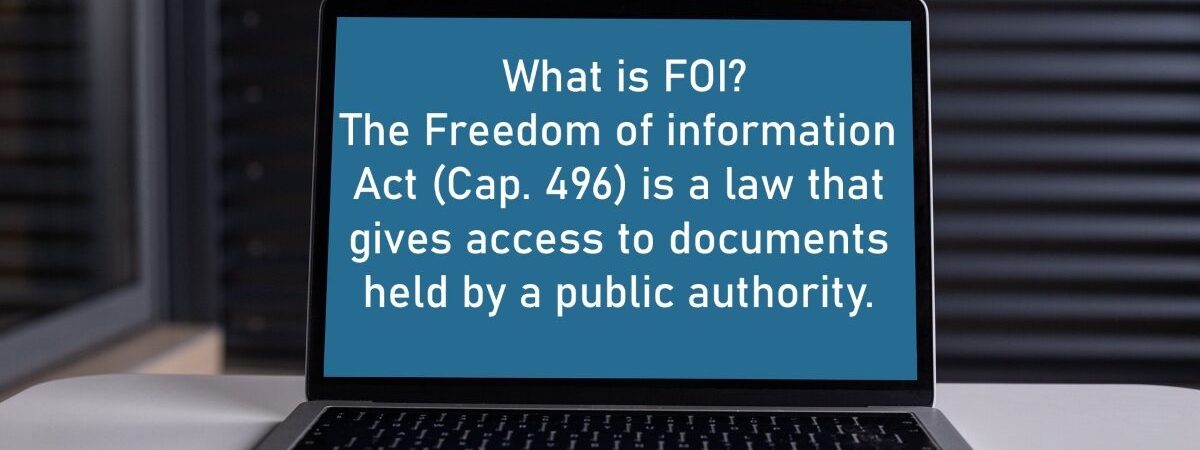This website uses cookies so that we can provide you with the best user experience possible. Cookie information is stored in your browser and performs functions such as recognising you when you return to our website and helping our team to understand which sections of the website you find most interesting and useful.



WELCOME TO THE WEBPAGE REGARDING THE FREEDOM OF INFORMATION ACT
The Freedom of Information (FOI) Act (Cap. 496) establishes the right to the general public to information held by public authorities in order to promote added transparency and accountability in government.
The general public may request documents held by Public Authorities. The Public Authority shall decide on your request within 20 working days. The FOI Act empowers you to escalate your request to the Information and Data Protection Commissioner, if you are not satisfied with the way the Public Authority handled your request.
Every Public Authority has appointed an FOI Officer who shall handle requests for documents submitted by the public and represent the Public Authority on all matters related to the FOI Act. For a list of all the Public Authorities and their FOI Officers (including contact details) click here.
In order to ensure correct implementation of the Act and to co-ordinate matters across government, a dedicated unit, the Data Protection and Information Coordination Unit was set up. More information on this unit can be found here.
Please consult the FAQ section on the FOIA, so that you are aware of your rights in the context of this law. More information on how to make a request can be found here.
IMPORTANT – The Data Protection and Information Coordination Unit regularly updates the database of contact details as set up for the purpose of the FOIA implementation. The Contact Lists section may be subject to changes from time to time. If no contact is assigned or if you cannot reach the public authority by email, please send your query or request to foicu@gov.mt.
You may wish to contact the Data Protection and Information Coordination Unit on +356 2247 8200.
About Us
- To act as a core support group for the FOI Officers (FOIOs)
- To co-ordinate the implementation of the Act through Principal FOI Officers (PFOIOs)
- To provide general direction and guidelines
- To maintain a service-wide IT system
- To carry out training as necessary
- To chair the FOI Forum (PFOIOs and Facilitators)
- To chair the FOI Network (all FOIOs including PFOIOs)
Details of the Data Protection and Information Coordination Unit
Data Protection and Information Coordination Unit
Details of the Information and Data Protection Commissioner
Details of the Information and Data Protection Commissioner
Details of the Information & Data Protection Appeals Tribunal
Details of the Information and Data Protection Appeals Tribunal
Useful Links
Here you can access documents related to the implementation of the FOI Act.
Freedom Of Information Act (Cap.496)
Code of Practice
S.L. 496.01 -- Fees charged by Public Authorities for Access to Documents Regulations, 2010.
S.L. 496.02 -- Timeframes for Lodging Complaints and Requests for Investigation and Review Regulations, 2010.
S.L. 496.03 -- Application and other Forms Regulations, 2010.
L.N. 156 of 2012 -- Entry into force.
Requests/Complaints received over the weekend or on public holidays will be addressed on the next working day. All references to "working days" in relation to the FOI Act should be understood as "Monday to Friday".
Personal Data is processed in accordance with the Data Protection Legislation. For further information please access our Data Protection Policy from here.
Contact Lists
Public Authorities under each Ministry
Here you can access the lists of Public Authorities (organised under the respective Ministry) and the contact details of the respective FOI Officers.
IMPORTANT: This page is being updated regularly to reflect public authorities set up according to changes in portfolio that may occur from time to time. Should there be a problem in contacting any public authority, please direct your requests to foicu@gov.mt.
- Office of the Prime Minister (OPM)
- Ministry for European Funds, Equality, Reforms and Social Dialogue (MEES)
- Ministry for the National Heritage, the Arts and Local Government (MHAL)
- Ministry for Foreign and European Affairs and Trade (MFET)
- Ministry for Social Policy and Children's Rights (MSPC)
- Ministry for Agriculture, Fisheries and Animal Rights (MAFA)
- Ministry for Social and Affordable Accommodation (MSAA)
- Ministry for the Economy, Enterprise and Strategic Projects (MEEP)
- Ministry for Inclusion and the Voluntary Sector (MIV)
- Ministry for Gozo and Planning (MGP)
- Ministry for Home Affairs, Security and Employment (MHSE)
- Ministry for Tourism and Public Cleanliness (MTP)
- Ministry for the Environment, Energy and Regeneration of the Grand Harbour (MEER)
- Ministry for Finance and Employment (MFE)
- Ministry for Education, Sport, Youth, Research and Innovation (MEYR)
- Ministry for Lands and the Implementation of the Electoral Programm (MLI)
- Ministry for Justice and Reform of the Construction Sector (MJR)
- Ministry for Health and Active Ageing (MHA)
- Ministry for Transport, Infrastructure and Public Works (MTIP)
- Non-Ministerial (Non-Min)
FAQs
Moreover, public authorities are duty bound to reply to a “single request”, and it may ask you to redefine your request if it refers to a number of different documents that are unrelated.
A single request refers to a request for one document or a request for specific or closely related information. The public authority can charge processing and additional fees for each and every request. Refer to “How much does it cost to make an FOI request?” below.
The Freedom of Information Act (FOIA) states that a ‘public authority’ means the Government, including any ministry or department, government Agencies, as well as any entity established under the law in which the government of Malta has a controlling interest or over which it has effective control. You can make a request under the FOIA, to all such public authorities. A complete list of public authorities organised under each Ministry can be found on this website under the item ” FOI Contact Lists”. Public authorities that do not fall under Ministerial control are also listed.
However, the FOIA does not apply to documents held by the Local Councils, the Electoral Commission, the Employment Commission, the Public Service Commission, the Office of the Attorney General, the National Audit Office, the Security Service, the Ombudsman and to certain documents held by the Broadcasting Authority.
Every person resident in Malta or who has been resident for a period of at least five years, and who is either a citizen of Malta or a citizen of any other EU member State or countries within the EEA, is eligible to make a request under the FOI Act.
An applicant can ask for any type of document on which information has been recorded, in whatever format and irrespective of whether the information can be read, seen, heard or retrieved with the aid of any other article or device. However a number of exemptions apply ( Part V and VI of the Act), for instance in relation to documents that affect national security, international relations and enforcement of the law.
All Cabinet related documents are exempt from disclosure under the FOIA. However, the Prime Minister may identify certain Cabinet documents that are 30 years old or more, in order for such documents to be subject to disclosure.
Another exception includes the disclosure of Cabinet documents that contain purely factual information on matters and decisions that have been published.
A request for accessing a document or information under the FOI Act can be submitted via the e-ID on the FOI Portal (http://www.foi.gov.mt/). Now, an online request can also be done without the need for the applicants to register through e-ID.
FOI requests are considered valid if they are submitted by eligible applicants as explained in Article 2 of the FOIA. (Refer to “Who can make a request?” above). It is for this reason that applicants are required to make reference to their ID card or residence permit with any request submitted. In order for a request to be considered as valid it should also satisfy requirements provided for in Article 6 of the FOIA, namely that a request is made to a public authority, it should include a description of the document being requested, the contact details of the applicant and the manner and format in which one wishes to obtain the document. In order to ensure that all such details are provided, members of the public are encouraged to use the prescribed forms that are available on this website.
If any of the details are missing, the public authority is duty bound to contact the applicant to make the necessary clarifications or corrections. Processing of requests can only start soon after they satisfy such requirements.
After the Request is submitted, the FOI Officer of the public authority in question will review your request and the public authority will decide on whether to grant you access or not to the document requested, according to the provisions of the Act.
A Public Authority is bound by the FOI Act to take a decision on your request and inform you about it within 20 working days from the date of submission. There may be situations, for instance when the request is for a large number of documents or requires search through a large number of documents or when consultations with third parties is needed in order to decide on the request, when it is necessary for this time limit to be extended. The extension shall be of up to a maximum period of 40 working days from when the original request was received, and this regardless of when, within the original 20 working day window, the authority informs the applicant of the need for an extension. You will be informed by the Public Authority of the extension within 20 working days from submitting your request, the reason for it, and when your request will be answered. You will also be informed of your right to complain.
No. You need not provide a reason for your request. The Public Authority does not have the right to ask about the reason for your request.
A complete list of all the Public Authorities and the contact persons to whom you can submit a request can be viewed by clicking here.
Submitting a request under the FOI Act is free. However, if you are informed that the document or information you requested can be provided, you will also be informed of the charges that will or may apply. The amounts charged are regulated by Legal Notice 158 of 2010 (Fees Charged by Public Authorities for access to documents Regulations, 2010) and the maximum amount that can be charged for a single FOI request is €40.
Once you are informed of the cost in relation to the requested document, you have 20 working days to effect the payment or otherwise your request will be considered as abandoned. If no fees have been charged the public authority is duty bound to provide the document within 10 working days from the date in which it communicated its decision to you in respect of the document.
The Public Authority shall provide you with the document requested within 10 working days from when you pay the applicable fee. If no fees have been charged the public authority is duty bound to provide the document within 10 working days from the date in which it communicated its decision to you in respect of the document.
When a public authority communicates the decision on your request it will explain whether the request will be accepted (in full), i.e according to all terms specified in your request, or accepted in part, i.e providing a document with deletions of exempt matter OR in a different format other than that requested by you, or it can be refused, i.e that access to the document will not be provided.
If you are not completely satisfied with the way your request was handled, you can primarily complain to the Public Authority through its internal complaints procedure (Details are found on the Acknowledgement to your Request Form), which shall reply to your complaint within ten (10) working days. You should submit your complaint to the Public Authority not later than thirty (30) days from the last communication of the Public Authority or the act or omission giving rise to the complaint, whichever is the later date.
Complaints can be submitted when:
- you do not receive any notification from the public authority,
- the public authority has extended the 20-day working timeframe,
- your request is refused,
- the format of the document that will be provided is different to your original request (this includes the provision of a document that has deleted matter, or the provision of a different document than that requested), or
- you consider the fees charged as excessive.
Should you still not be happy with the decision of the Public Authority, you may address a complaint to the Information & Data Protection Commissioner, as provided for in Article 23 of the FOI Act. Complaints or requests for investigation and review addressed to the Commissioner shall be lodged within a maximum of sixty (60) days from the receipt of the final communication from the Public Authority concerned. The Information and Data Protection Commissioner shall investigate your complaint in accordance with the provisions of Part IV of the FOIA , however, pending such decision, no further action will be taken by the Public Authority.
It is very important to always quote the reference number given to your request when communicating with the Public Authority or the Information & Data Protection Commissioner. The reference number is the number quoted on the Acknowledgement Form sent to you when you submit a request.
If an applicant is not satisfied with the outcome of the decision communicated by the Information and Data Protection Commissioner (IDPC), he/she may lodge an appeal with the Information and Data Protection Tribunal within thirty (30) days of receipt of such communication. Soon after the IDPC decides on a complaint, a decision notice will be issued to both applicant and public authority. It should be noted that the public authority may also resort to this appeal mechanism. Further to this, as stated in Article 40 of the FOIA, decisions of the Tribunal are subject to appeal to the Court of Appeal as outlined in Article 51 of the Data Protection Act. Refer to the section ‘About Us’ to find the contact details of the Information and Data Protection Tribunal.
As a general rule, personal information is treated under the General Data Protection Regulation (EU) 2016/679. Personal data is in fact not available for disclosure under the FOI Act, as per provisions of Art. 5(3)(a). You may however request information on a decision or recommendation made on yourself as per provisions of Article 20 of the Act.
As soon as a public authority receives a request, it considers whether it contains the appropriate information so the process may be started. If not, the FOI officer will be in contact in order to make the necessary clarifications. As soon as this is cleared, the FOI officer will log the request on a tailor made IT system. From then on, all notifications and information will be communicated to you via this system. If you submit a request through the e-ID section of the website (only e-ID card holders can subscribe to this service), the request will immediately find itself in the FOI officer’s backend system. For instructions on how to submit a request via e-ID, please consult the “Guide to e-ID users” that can be found on this website.
Contact Details
Address
Data Protection and Information Coordination Unit 280, Level 3, Republic Street, Valletta




